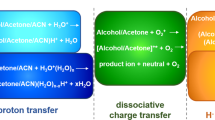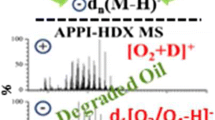Abstract
So far, the interest of Plasma Desorption Mass Spectrometry (PDMS) is focused on non-volatile, often thermally labile organic compounds. The main advantage of PDMS is that it is accessible to substances that cannot be converted into the gas phase without dissociation as it is typically for compounds beyond mass number 1000. In the present work, we report about first results of studies where PDMS has been applied to frozen organic compounds that are liquid or gaseous at room temperature and that are generally easy to handle by other methods such as Electron Ionization (EI) or Chemical Ionization (CI) mass spectrometry. Our aim is to investigate:
-
(a)
the possibilities of this method in comparison to ordinary mass spectrometry,
-
(b)
the ion formation process by using simple low-mass compounds and two-component mixtures,
-
(c)
the behavior of ion formation during sublimation and temperature rise.
Access this chapter
Tax calculation will be finalised at checkout
Purchases are for personal use only
Preview
Unable to display preview. Download preview PDF.
Similar content being viewed by others
References
K. Wien, Proceedings of the III Workshop on Small Systems: Mass Spectrometry of Large Non-Volatile Molecules for Marine Organic Chemistry, eds. E. Hilf, W. Tuszynski, Spiekeroog Island/FRG 1989, page 82
P. Weiland, Diploma thesis 1990, Institut für Kernphysik, Technische Hochschule, Darmstadt/FRG
F. W. McLafferty, F. W., and D. B. Stauffer, The Wiley/NBS Registry of Mass Spectral Data, 1989 (Wiley & Sons)
K. Wien, Rad. Eff. Defects in Solids 109 (1989) 137
B. T. Chait, W. C. Agosta and F. H. Field, Int. J. Mass Spec. and Ion Proc. 39(1981)339
R. Moshammer, R. Matthäus, K. Wien, Y. LeBeyec and G. Bolbach, Proceedings of the V Int. Conf. on Ion Formation from Organic Solids (IFOS-V), eds. A. Hedin et al., Lövanger 1989, Sweden
P. Sigmund and M. Szymonski, Appl. Phys. A33 (1984) 141
G. Saeve, P. Hakansson, B. U. R. Sundqvist, E. Soederstroem, S.-E. Lindqvist and J. Berg, Int. J. Mass Spec. Ion Proc. 78 (1987) 259
R. Matthäus, and R. Moshammer, Proceedings of the I Workshop on Physics of Small Systems: PDMS and Clusters, eds. E. Hilf, F. Kammer, K. Wien, Wangerooge Island/FRG 1986, Springer Lectures Notes in Physics 269 (1987)241
Author information
Authors and Affiliations
Editor information
Editors and Affiliations
Rights and permissions
Copyright information
© 1991 Plenum Press, New York
About this chapter
Cite this chapter
Wien, K. (1991). PDMS with Volatile Organic Compounds. In: Standing, K.G., Ens, W. (eds) Methods and Mechanisms for Producing Ions from Large Molecules. NATO ASI Series, vol 269. Springer, Boston, MA. https://doi.org/10.1007/978-1-4684-7926-3_4
Download citation
DOI: https://doi.org/10.1007/978-1-4684-7926-3_4
Publisher Name: Springer, Boston, MA
Print ISBN: 978-1-4684-7928-7
Online ISBN: 978-1-4684-7926-3
eBook Packages: Springer Book Archive




